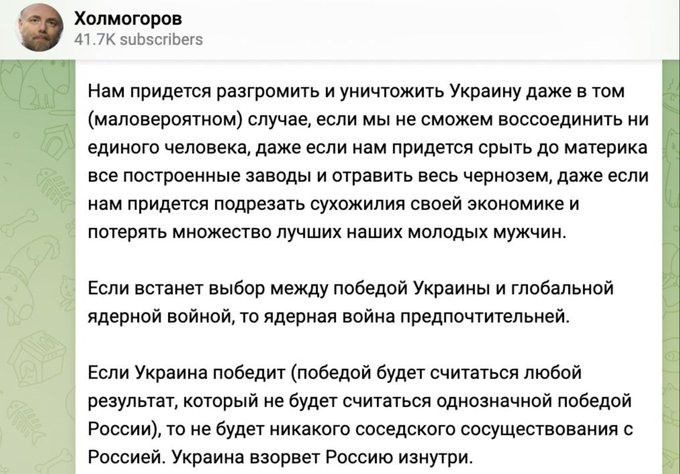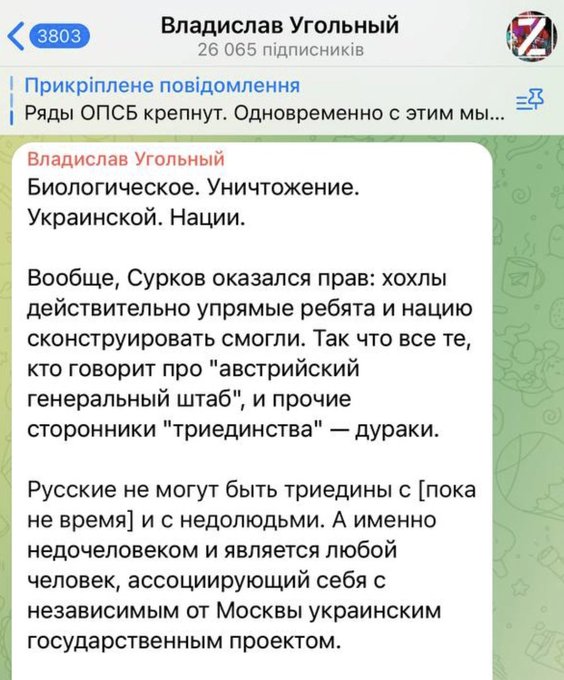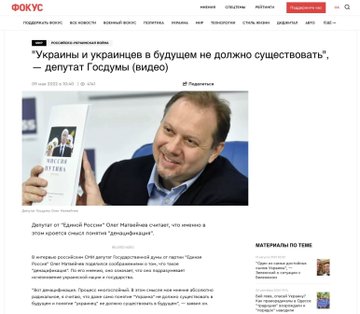Tag: China
No, it’s not ending until Zelensky says so
Ukraine has won back substantial territory in Kharkiv province in the past 10 days or so. They snookered the Russians into thinking the offensive would come in the south. Moscow moved many of its best troops there, leaving the northeast ill defended. And in recent days both China President Xi and India’s Prime Minister Modi have scolded Russian President Putin, suggesting he should sue for peace. This has made some wonder if the end of the war is near.
Location, location, location
The short answer is no. Russia still has vast resources of men and materiel to throw at the Ukrainians. Putin might like a ceasefire to give himself some time and space to resupply. But that is a far cry from readiness to negotiate a serious settlement. Nor are the Ukrainians interested in allowing the Russians to stay on their territory. President Zelensky has made it clear he is fighting for 100% of his 2014 pre-invasion sovereign territory. He will come under pressure from the Europeans and Americans to accept a ceasefire if Russia is rolled back to the lines of February 23.
Identity, identity, identity
I doubt even then Zelensky will be tempted to stop if his forces are still moving in the right directions. The war has vastly increased his own popularity, from a nadir a year or two after his election. He would be risking disappointment on the home front if he stopped the war before regaining as much territory as possible.
Ukrainians have gained a far stronger sense of national identity than appeared to exist before the war. This is what happens when you kill people because of their identity. It reinforces that identity among those who remain alive. Ukrainians know that the discourse in Russia is genocidal.
How would you feel if you were Ukrainian?
Stéphane Siohan tweets some compelling examples:
#Ukraine I am not sure that Europe and the world understand the nature of the genocidal discourse about Ukraine circulating in the Russian information space. Read the following excerpts. — THREAD (1)
Telegram channel of the journalist Ehor Holmogorov: “We will have to crush & destroy #Ukraine even if we have to tear down all their factories and poison all the black soil, even if we have to cut the tendons of our economy and lose many of the best our young men.” (2)

Journalist Ehor Holmogorov: “If the choice is between a Ukrainian victory and a global nuclear war, then a nuclear war is preferable. If Ukraine wins , then there will be no neighborly coexistence with Russia. Ukraine will blow up Russia from within (3)
Vladislav Ugolnyi, Russian publicist: “Biological destruction of the Ukrainian nation. Russians cannot be live in unity with subhumans. Namely, any person who associates himself with a Ukrainian project independent of Moscow is a subhuman.” (4)

Russian Duman MP Oleh Matveychev: “Ukraine and Ukrainians should not exist in the future.” The head of Russian party “Motherland”, Alexei Zhuravlev, proposes to “destroy two million Ukrainians”.


A hard winter of cold and deprivation could temper Ukrainians’ enthusiasm for continuing the war. But until it does the Russians have little hope of convincing Ukrainians that they would be better off negotiating than continuing the fight.
Russia thinks it has better odds with the Europeans
The Russians think some in the European Union are likely to cry uncle before the Ukrainians do. But the situation there isn’t as bad as it might appear. Those whom Russia most directly threatens will remain stalwart. Estonia, Latvia, Lithuania, and Poland know that they are next if Putin succeeds in Ukraine. Sweden and Finland have abandoned neutrality and stand with NATO. Germany is vulnerable because of its reliance on Russian gas, but Berlin appears to have made progress in avoiding a catastrophe when Moscow cuts it off during the winter. France depends far less on Russian gas but President Macron fancies himself a skilled mediator. He isn’t likely to succeed in that role. Gas prices have hit the UK economy hard, but it has been a strong and constant supporter of Ukraine.
Are the Americans soft?
President Biden has so far been rock solid in backing Ukraine with money, arms, and diplomatic support. There are however on both right and left in the US Congress some who are less committed and even a few who implicitly back Russia. That perspective has had little traction with the American people. But it is possible, if the economy dips into recession, that doubts will grow. There is also a portion of the American foreign policy establishment that worries about the impact on Russia of a defeat. Some prefer the devil they know, especially if he has nuclear weapons.
But Biden sees Ukraine as a main theater of conflict with autocracy. Were the Ukrainians to lose, or settle for an agreement that leaves Russian troops on their soil and ready to make war again in the future, it would look as if autocracy had won. He is unlikely to yield until compelled.
Stevenson’s army, September 16
– The question of “dues” to campaign committees came up in class. Punchbowl News has a story.-
– Biden signed an executive order on Chinese investments. NYT has more.
-House GOP announces its agenda.
– FT reports pressure on Turkey.
– FP says Iraq is on verge of shiite civil war.
-At Harvard they can’t read cursive.
My SAIS colleague Charlie Stevenson distributes this almost daily news digest of foreign/defense/national security policy to “Stevenson’s army” via Googlegroups. I republish here. To get Stevenson’s army by email, send a blank email (no subject or text in the body) to stevensons-army+subscribe@googlegroups.com. You’ll get an email confirming your join request. Click “Join This Group” and follow the instructions to join. Once you have joined, you can adjust your email delivery preferences (if you want every email or a digest of the emails).
Stevenson’s army, September 15
– SFRC reports Taiwan bill. More from The Hill.
– Senators push terrorism designation on Russia.
– Members criticize new Egypt aid.
– Administration set up Afghan aid bypassing Taliban.
– Uncertain schedule for NDAA.
Charlie wrote later:
[I have grandparent duty most Fridays, so let me upload some extra items now]
– WaPo report on Xi & Putin comments.
– More Senate staff will get top clearances.
– Biden’s Asia trade program IPEF gets some movement. Here’s CRS background.
– In addition to Taiwan bill [text here], SFRC yesterday reported what it calls a State Dept Authorization bill. Since it’s 68 pages long and covers a lot of territory, it could be the first significant such measure in 20 years [though flimsy bills with that title have been enacted since.]
– Beware: there is a faction among GOP candidates who have a scary view of civilian control of the military. For example.
My SAIS colleague Charlie Stevenson distributes this almost daily news digest of foreign/defense/national security policy to “Stevenson’s army” via Googlegroups. I republish here. To get Stevenson’s army by email, send a blank email (no subject or text in the body) to stevensons-army+subscribe@googlegroups.com. You’ll get an email confirming your join request. Click “Join This Group” and follow the instructions to join. Once you have joined, you can adjust your email delivery preferences (if you want every email or a digest of the emails).
Embellishing reality isn’t helpful
Genc Pollo, former minister and member of parliament in Albania, reacts to this “debrief” with US Ambassador to Belgrade Chris Hill:
“War is too important to be left to the generals” is a bon mot attributed to Georges Clemenceau. As French Prime Minister, he oversaw the victory of his country and the Entente Alliance in the First World War.
I would hesitate a lot to apply his wisdom to diplomats dealing with the Balkans, especially with former Yugoslavia problems. Diplomats here means primarily European and US officials trying to find solutions to challenges ranging from bloody conflicts to dangerous political impasses.
We ought to be thankful for their well-meaning efforts and should celebrate the ones with successful outcomes.
Still listening to this interview of Christopher Hill, the US Ambassador to Serbia, with the Atlantic Council I was a bit perplexed. Disclosure: he’s a good friend of mine from the early 90s when he was a cooperative a helpful Deputy Head of Mission in Tirana. Chris Hill is connoisseur of the region with a lot of experience in difficult situations. He is right in most of what he says. But some of his assertions could be problematic. Let us take these issues one by one.
Issue 1: “There is a criticism that you sometimes hear in the Balkans that somehow this is some effort by Serbia which is so big to dominate the others. That’s the kind of criticism you might have heard in the European Union decades ago about Germany….I’m not sure it’s that valid a criticism.”
Germany is big for sure, but in the initial EEC of six and the actual EU of 27 member states, she finds herself in a balanced structure in terms of political power, economic weight, and population. Berlin carries much weight but can’t and doesn’t rule single-handedly. Look at the European Central Bank.
Besides post-war Germany is a friendly democracy.
By contrast, within the Open Balkans trio (Serbia, Albania, and North Macedonia) Serbia would rule unchallenged.
Issue 2: “[Open Balkans] does support EU standards, in terms of the rule of law, in terms of regulations.”
It remains a mystery to many why supporters of Open Balkans are silent about the Common Regional Market of the Berlin Process. Or trash it along with defunct initiatives. The Berlin Process has all the pretended virtues of Open Balkans and none of its serious downsides. Simple question: would you trust the observance of EU standards in a Western Balkans initiative where the EU is institutionally involved rather than in a local get-together hosted by two corrupt autocrats? Lobbyists might paint a Potemkin village, but Serbia and Albania are well advanced in their latest trajectory towards one-person rule.
Issue 3: “I would say that the Serbian relationship with Albania is as good as it’s probably ever been in history.”
The relationship between Albania and Serbia has generally been always excellent or normal, Including during the rule of Enver Hoxha and Josip Broz Tito. It went awry when things in Kosovo turned terrible. The current rapprochement between Prime Minister Rama and President Vučić is solves a problem that doesn’t exist. It hasn’t contributed in any meaningful way to “normalization” between Kosovo and Serbia, let alone mutual recognition, which is the crux of the matter!
Issue 4: “But I think, if you look at the broad sweep of this issue and the broad arc of where Serbia is going, it’s heading West. You point out the opinion surveys that suggest that Serbia that many Serbs have sympathies that lie further east. …if you look at where Serbian young people are going for their education for jobs, for their training and what type of model they see themselves focusing on, it’s very much toward the West.”
Past are the days when people in the West should believe globalization and economic engagement wwill tame China and Russia, nudging them towards becoming responsible actors in the rules-based world order. We’ve seen Chinese and Russians, including the nomenclatura’s offspring, enjoying life or studying in the West only to return home to embrace autocracy and imperial revisionism.
This to some reasonable extent applies to Serbia. Because the nature of the Serbian regime has not changed much, and its propaganda has worsened.
If the model of post-Milosević Serbia applied to post-war Germany, it would mean having Joseph Goebbels as West Germany’s chancellor in the 60s. He would have refused to adopt Western policies toward the Soviets.
This is reality, and embellishing it isn’t helpful.
Stevenson’s army, September 8
– NYT notes shock waves to global economy.
– A former student who is a China watcher recommends this article on Xi Jinping by a longtime professor at the CCP’s party school.
– NYT notes widely disparate punishments for the few cases of voter fraud.
– Journalist Josh Barro has an interesting explanation for why Biden’s low approval ratings don’t seem to hurt Democrats much.
– SecState Blinken in Kyiv announces more military aid.
– DOD wants military testing facility in Saudi Arabia.
– AP says Retired LTG Flynn is building a political movement.
My SAIS colleague Charlie Stevenson distributes this almost daily news digest of foreign/defense/national security policy to “Stevenson’s army” via Googlegroups. I republish here. To get Stevenson’s army by email, send a blank email (no subject or text in the body) to stevensons-army+subscribe@googlegroups.com. You’ll get an email confirming your join request. Click “Join This Group” and follow the instructions to join. Once you have joined, you can adjust your email delivery preferences (if you want every email or a digest of the emails).
Stevenson’s army, September 7
– 538 notes how many election deniers are running for office.
– AP finds policy, other officials as members of Oath Keepers.
– WaPo says Mar-a-Lago documents included information on foreign nuclear capabilities and highly limited access material.
– Putin has a new doctrine about a Russian world. [DPS note: is isn’t new]
– Apple can’t shift production of iphone out of China
– House GOP plans rerun of 1994 tactic
– Despite increase in budget for House pay, Legistorm reports:
85% of representatives haven’t touched their MRA increase, LegiStorm data shows
Posted by Keturah Hetrick on Sept. 6, 2022
Months after an unprecedented increase to the Members’ Representational Allowance, 85% of representatives haven’t used even a dollar of those additional funds, according to a LegiStorm analysis.
In March, Congress authorized a 21 percent increase to the House’s office budgets for the 2022 fiscal year. That increase – the highest since the MRA’s creation in 1996 – gave the average office an extra $317,241 to spend in 2022 year, equivalent to $79,310 per quarter.
For most of Congress, the old funds would have been enough: 85% of representatives disclosed Q1 and Q2 spending at rates that would have been sustainable without any MRA increase.
The MRA increase was intended to bolster staffers salaries in order to attract and retain talent. The average personal office spent just 36.34% of its budget in the first six months of the year, leaving the average office more than $91,000 shy of even touching the increase.
Democrats on average have spent 1.72% more of their office budgets than Republicans, a difference of about $32,500 per office.
The House’s minimum salary of $45,000 per year went into effect on Sept. 1. The extent of staffer pay increases from the new salary floor won’t be clear until the House releases its Q3 expense data in late November.
As Politico reported this morning, the House Select Committee on Modernization of Congress and the House Administration Committee plan to announce a resolution today that includes a reevaluation about how the MRA is calculated.
My SAIS colleague Charlie Stevenson distributes this almost daily news digest of foreign/defense/national security policy to “Stevenson’s army” via Googlegroups. I republish here. To get Stevenson’s army by email, send a blank email (no subject or text in the body) to stevensons-army+subscribe@googlegroups.com. You’ll get an email confirming your join request. Click “Join This Group” and follow the instructions to join. Once you have joined, you can adjust your email delivery preferences (if you want every email or a digest of the emails).




 RSS - Posts
RSS - Posts
